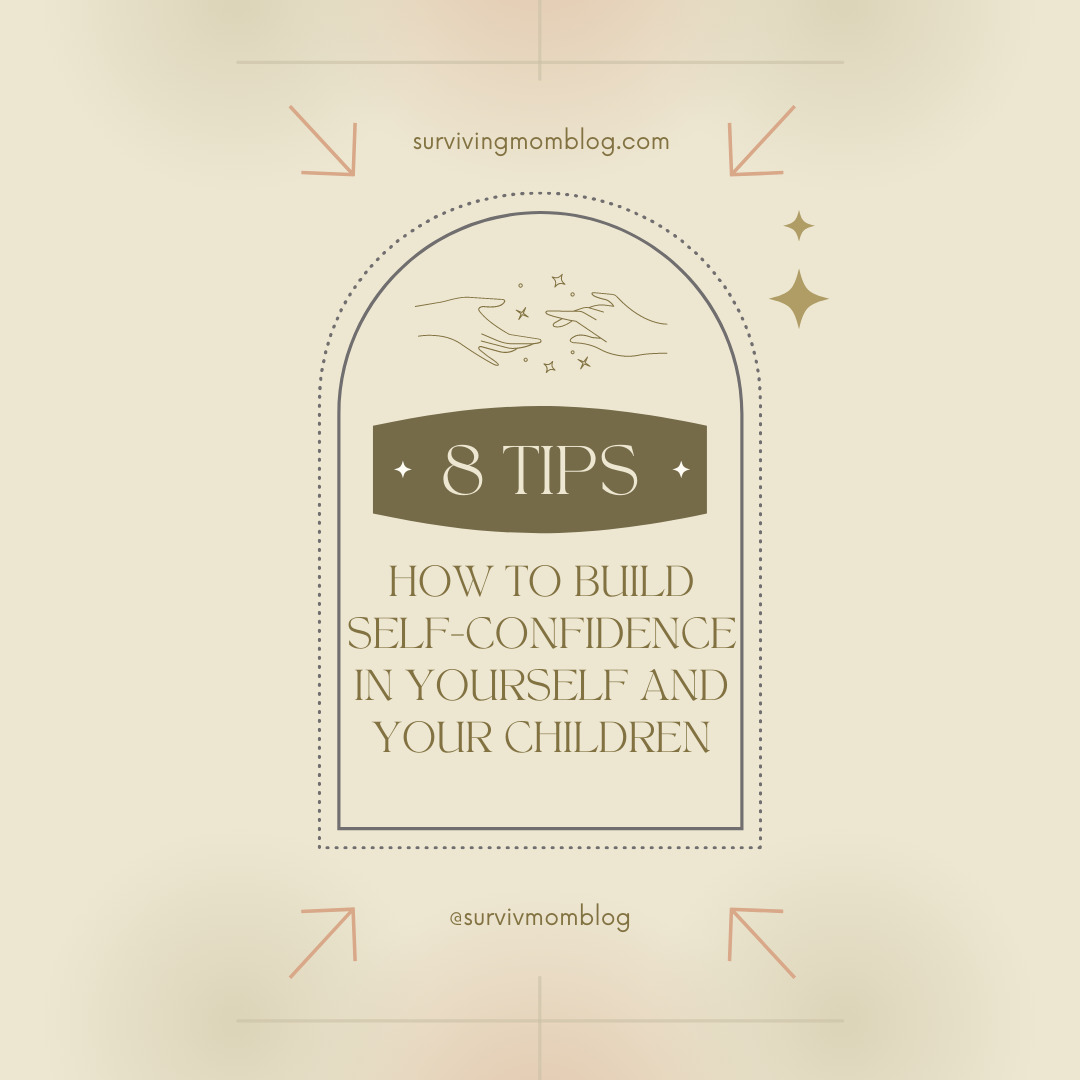
Self-confidence is something we all want to build and something many of us are lacking. It isn’t surprising that we lack confidence as adults. Many of us were told as children that our best was not enough. Others didn’t get any motivation or encouragement to step out of their comfort zone or try something that was challenging. What was once our parents’ voices soon turned into our inner voice/critic. As a result, the story we believe as adults is that we aren’t good enough. The good news is that there are strategies to build self-confidence in yourself and your children.
my struggles with self-confidence
I grew up with a mom that expected perfection. When I was 5 years old, I had a small writing assignment for school. I was extremely proud of what I wrote and showed it to my mother. Her response was to rip it into pieces and instruct me to write it again. That experience rattled me and will forever be imprinted in my mind. The lesson I learned was that I should feel intense shame if my best wasn’t perfection.
My struggle with perfection crept into every facet of my life. In first grade there was a competition that whoever read the most books by the end of the month would get a box of crayons. I was determined to be the winner. So was another girl in the class. Eventually other classmates stopped participating in this contest, but neither me nor this girl would relent. Finally, the teacher stopped the contest and declared that we both were the winners.
I defined myself and my value based on how well I did in school.
I would beat myself up over any mistake I made. In my mind, nothing other than an A was an option. Eventually my mother told me that I didn’t have to get top grades as long as I was trying. By this point her words rang on deaf ears; the bell could not be unrung. I was terrified of not getting the top grades in exams and I was ridden with anxiety every time I had to write a report or do a presentation. I always agonized that I wasn’t good enough despite the number of times that was proven to be untrue.
Shame, not self-confidence, became my constant companion. I feared everything because I didn’t believe that trying was what was most important. In my mind, if the result was unsuccessful, the effort was worthless.
the inner critic that creates guilt and shame
Regardless of our childhood circumstances, I know that many of you live with that same inner critic. If we try something and it isn’t a success, we beat ourselves up over it rather than feel proud of ourselves for trying. It only reinforces that we shouldn’t put ourselves out there or reaffirms our belief that we are failures.
It is often easier to look at the laundry list of mistakes or flops rather than focus on how hard we tried or the things we did well.
This way of thinking starts to take on a life of its own, and eventually we tell ourselves that we are failures instinctually.
When we speak and feel this way about ourselves, is it any wonder that our voice becomes the inner voice of our own children? It is an endless cycle of guilt, shame, and self-contempt. In order to teach our children to have self-confidence, flaws and all, we first have to believe that about ourselves.
What if we changed our inner voice? Told ourselves that we are enough just as we are? Applauded our efforts rather than our successes? What if we recognized that what matters most is putting ourselves out there? What if our determination and resiliency was how we judged ourselves rather than a tally of achievements?
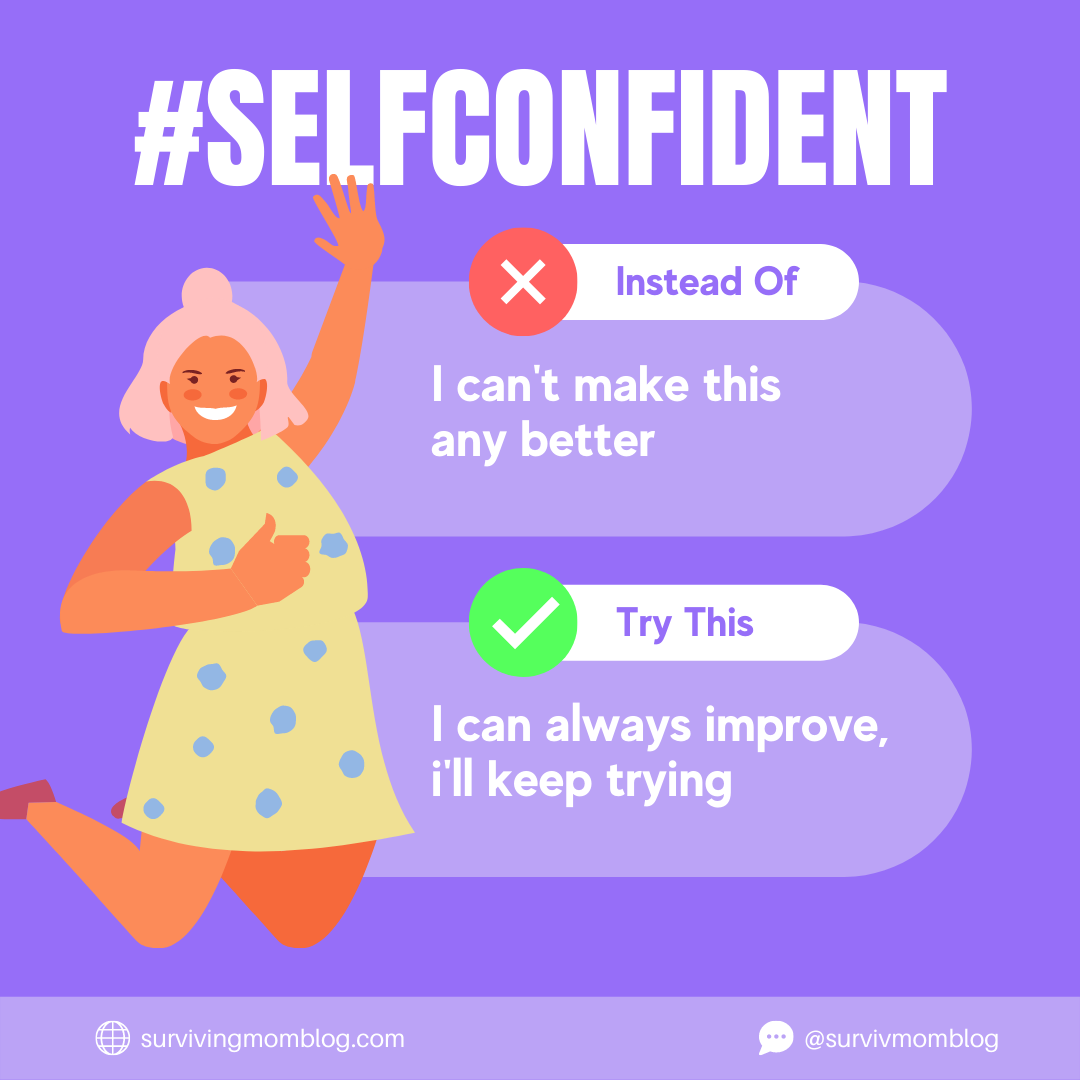
ways to build self-confidence in ourselves
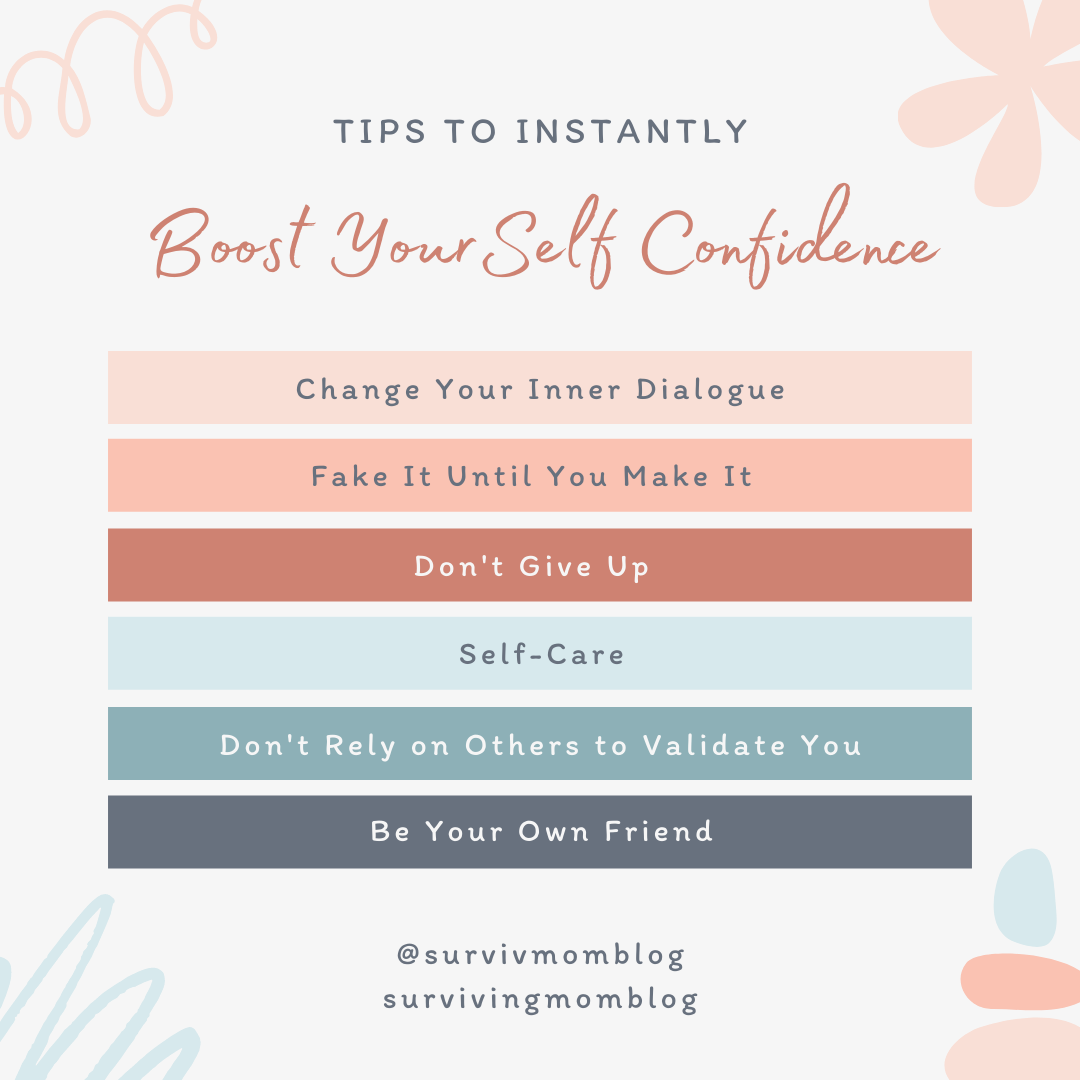
Obviously, this is much easier said than done. Stopping and changing the story we have told ourselves constantly isn’t going to magically vanish. Luckily, there are ways of building self-confidence in ourselves and our children:
(1) Change your inner dialogue
Our inner voice is determined to rear its ugly head any time we feel guilt or shame. We can counter those thoughts by putting new ones there. Each time that we try something, no matter what the outcome, we need to acknowledge that putting ourselves out there is an accomplishment in of itself. Showing up and trying is something to be proud of. Counter your thoughts of shame with thoughts of recognition for how hard you try.
This way of thinking applies to our children as well. Instead of commending our children for their grades on a test, applaud them when you see they are studying and taking it seriously. Acknowledge the effort, not the result. Success isn’t a guarantee, but it takes great courage to put oneself out there and try. Our children deserve recognition for the journey instead of the destination.
(2) Fake it until you make it
This new message that you are telling yourself doesn’t align with the inner critic you’ve lived with for years. It takes time to truly feel what you are now saying. Reaffirm this new way of thinking with mantras such as “I am enough,” “I can do hard things,” and “I am brave,” and say them to yourself and your child. Counter those shameful thoughts with confident ones.
Make a list of these affirmations with your child. Explain that this list is to be used daily and when we feel badly about ourselves or are afraid to try. Let your children see that you are using this list and encourage them to use it as well.
(3) Don’t give up
I remind myself and my daughter that no matter how many times we get knocked down, all we can do is keep picking ourselves up. It is inevitable that we will make mistakes. What we do with those mistakes is what matters.
I wrote a children’s book, and the road to getting an agent is far harder than what I anticipated. My daughter has seen me send query letter after query letter. She has asked me why I don’t give up. I told her that some of my greatest accomplishments are the ones I had to work at the most to achieve. My hope is that my daughter sees that what truly matters is perseverance and believing in yourself.
(4) Instead of focusing on your failures, make a list of the things you accomplished despite feeling afraid or self-conscious.
Ask your child to make a list of things he/she worked hard to achieve. The next time you or your child feel badly about yourself, look at the list of reminders of how brave you are. Remind yourself and your children that it takes great courage to put yourself out there.
(5) We all have strengths and weaknesses
We are human, so we are flawed. It is inevitable that there will always be someone that is able to do something better than us. As a recovering perfectionist, I remind myself and my daughter that all we can strive for is to be the best versions of ourselves. Perfection isn’t the goal, but courage and strength of conviction is everything.
(6) Self-care is necessary to incorporate into our life and our routine
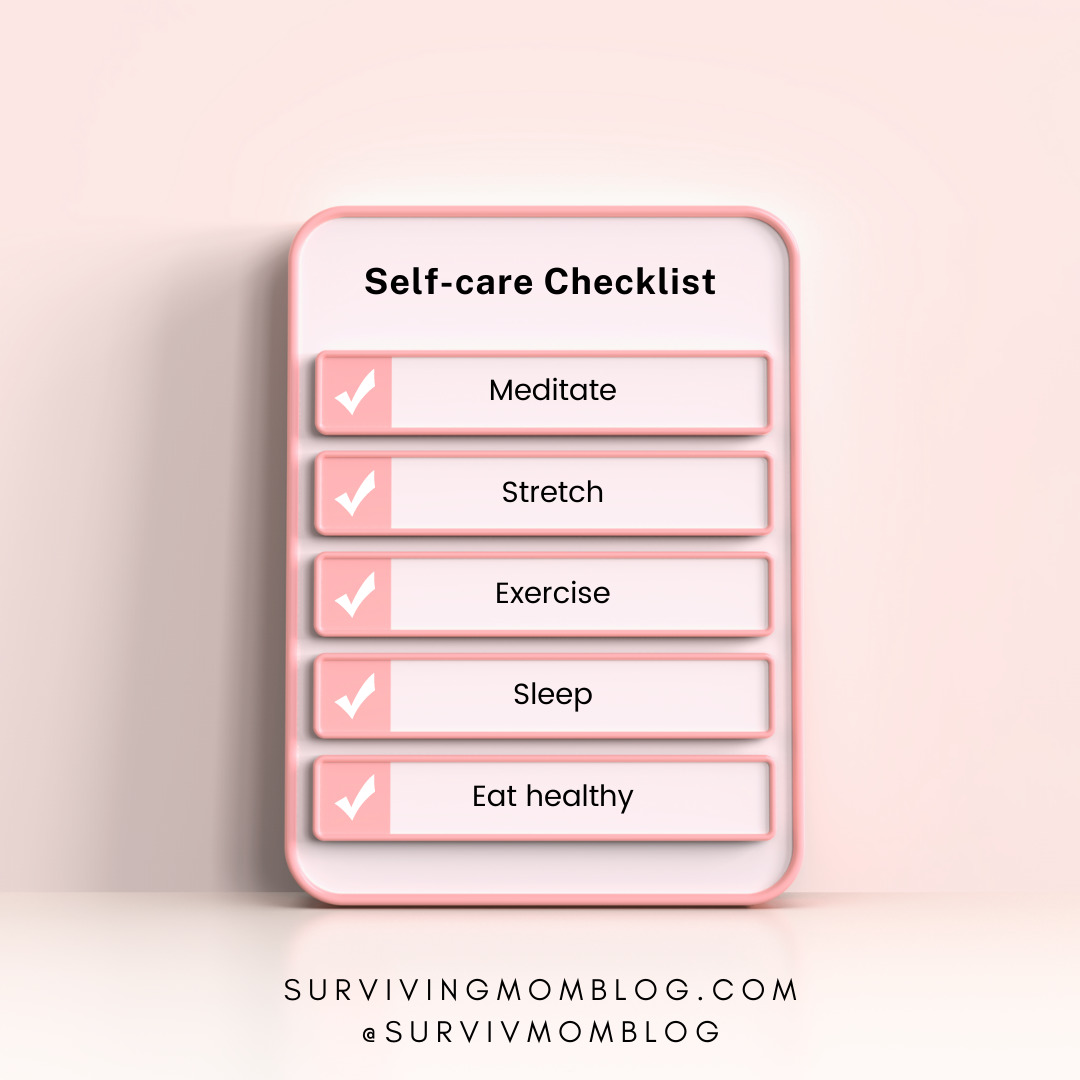
Encourage your children to explore what they enjoy and to devote time to it. Our emotional well-being is the foundation for learning to love ourselves.
(7) Don’t rely on others to validate you and feel proud of you
Feel proud of yourself for trying regardless of what others say and do. Remind yourself and your children that there are people that will try to say and do things to make you feel badly about yourself. It is imperative to be your own supporter and cheerleader.
I remind my daughter often that she is not defined by any labels. She is defined by who she is as a person. That means that she should strive for inner beauty instead of focusing on her appearance. My hope is that she believes in herself as much as I believe in her.
(8) Be your own friend
When I feel shame or guilt, I often ask myself what I would say to my friend if the same thing was happening to her. I tend to give others far more support and understanding than I give to myself.
When I notice my daughter is being hard on herself, I ask her what she would say to her friend if that person was in the same situation. I then ask her to say those words to herself. That often helps her to put things into perspective.
Giving kindness and compassion to ourselves is crucial in building self-confidence. We need a gentle reminder that we deserve better than how we are treating ourselves.
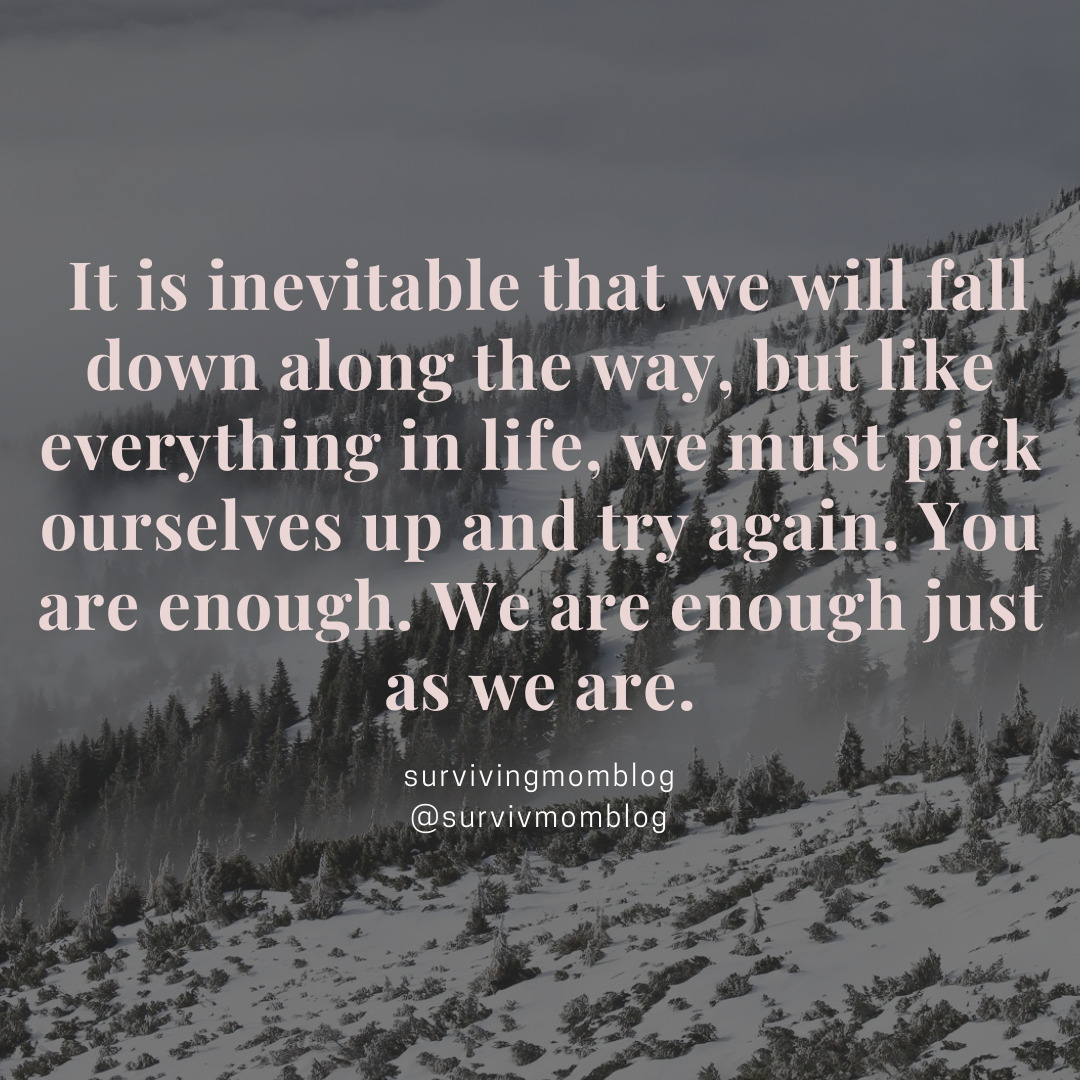
The journey to building self-confidence is a long and difficult one. There will be easier days as well as days that are more challenging. Be mindful of the story you tell yourself and the example you are setting for your children. It is inevitable that we will fall down along the way, but like everything in life, we must pick ourselves up and try again. You are enough. We are enough just as we are.